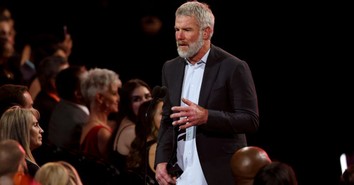Why Most Christians Fail to Seek God's Face in Their Lives

The world will only be changed when those who call themselves Christians begin to follow Christ, becoming scandalously present in the world in all of their Christlike particularity. Such a life is a formidable presence, forever marking everything in its wake.
Or not.
When I first went to college, I considered myself a Christian, but there was little of my life given over to Christ’s leadership, much less developed in intimacy. In reality, I pursued a life radically separated from Him. My freshman roommate was a Mormon, and I recall one night (after more than a few beers) talking with him about the inadequacies of his faith when he took a dagger and drove it into my soul: “Jim, how can you say anything at all about my faith with the way you live?”
There was nothing I could say. In truth, I wasn’t a Christ follower. In time, I would be, and that had everything to do with my relationship with Jesus and the degree to which I allowed that relationship to impact my life. I had to learn a simple truth:
To Live for God, We Must Live with God.
But what does this mean?
The answer rests in the goal of all spiritual formation, which is to be marked by the fruit of the Spirit—such things as love, joy, peace, patience, kindness, gentleness, self-control. But the fruit of the Spirit is just that. Fruit.
The metaphor is important.
Fruit does not exist in and of itself. It is something that is produced. It comes from a life source—a branch or a vine. A person does not decide to be patient, much less will themselves to be patient. Patience must be cultivated from the source of patience. That is why the Bible speaks of such things flowing from the Spirit. They emanate from a life lived in and through the Spirit. Only when a spiritual life is cultivated will spiritual fruit be manifest. The true goal of spiritual formation is not the fruit of the Spirit but rather the relational intimacy that produces the fruit of the Spirit.
So, is deepening the soul and becoming a spiritual person just about answering the command to love God?
Of course.
But that is the problem. “We have heard the words so often that we no longer hear them,” reflects Frederick Buechner. “They are too loud to hear, too big to take in. We know the words so much by heart that we scarcely know them any longer as words spoken to the heart out of a mystery beyond all knowing.”
But it runs deeper—we have made love for God tame.
An intimate relationship with God has become something subtly woven into the deepest recesses of our private lives instead of a reckless love bursting out of the seams of our soul, exploding into the world around us. We must recapture the words relating to love and relationship with God anew, and through them carve out a still point for our souls to absorb it all.
This is why, throughout the Scriptures, particularly in the cavernous devotional spaces of the Psalms, the recurring theme is pursuing an intimate relationship with God. After the initial throes of romance, love is not a state as much as a pursuit, something tended, nurtured, and developed. In the simple but profound words of the psalmist, we are enjoined to “Look to the Lord and His strength; seek His face always” (Psalm 105:4).
We should not let the brevity of the words lessen their impact. The most sensitive of souls have been profoundly shaped by their weight. This short verse is cited four times in Augustine’s The Trinity. Historian Robert Louis Wilken notes that “more than any other passage in the Bible, [Psalm 105] captures the spirit of the early Christian thinking.”
Yet most of us do not seek the face of God.
The impact of most Christ followers on this world is minimal because the degree to which we seek intimacy with Christ is minimal. When there is little that reflects a relationship with Jesus in us, we have little of Him to offer. I know that I have had opportunities when I could have made an impact, but I had little to give all because of spiritual anemia. There was more of this world than the world to come coursing through my veins. But we need not starve our souls or allow our relationship with God through Jesus to fade like the dying embers of an untended fire. We can seek the face of God.
But how?
To seek God’s face is a serious call, one that is to be engaged with utmost earnest. This raises the real question, offered most simply by the Quaker writer Douglas Steere: How does a person become increasingly Christian when he or she already is one?
The answer throughout Christian history has seldom wavered: Live the life that Jesus lived.
“We can… become like Christ,” writes Dallas Willard, “by practicing the types of activities he engaged in, by arranging our whole lives around the activities he himself practiced in order to remain constantly at home in the fellowship of his Father.” Willard uses an example of an all-star baseball player who is our idol. We want to pitch and run and hit as well as he does, so when we play, we take the stance that he takes, hold the bat as he does, and wear his brand of shoes. From this, we expect to perform as he does. And, of course, we don’t. “The star performer himself didn’t achieve his excellence by trying to behave in a certain way only during the game,” observes Willard. “Instead, he chose an overall life of preparation of mind and body.”
Christ Calls Us to This Kind of Discipline in Order to Answer His Call to Our World.
Yet, there are few spiritual athletes. We are weak, flabby, and out of shape. Our lives have become earthly in orientation and fleshly in operation. We conform to the patterns of the world when we could be morphed into the very image of Christ (see Romans 12:1-2). We focus on religion instead of relationship, practice instead of passion. Such a life – not rooted in an authentic relationship with God, full of rhetoric and posturing, form, and mannerism – is all but empty. We become people possessed with knowledge “about” as opposed to an acquaintance “with.”
But only an intimate relationship with the living God is true spirituality. And only true spirituality can impact the world.
So, how do we live with and like Jesus?
Two thousand years of spiritual history have spoken with a single voice: the reading and study of God’s Word, obedience, prayer, silence and solitude, and some form of spiritual direction. These are the investments and practices that, time and again, have led men and women to true spirituality.
Speaking for myself, I do not feel that I have cultivated a model spiritual life, but I know that it is a spiritual life that I most want. It is from the depths of the soul that a life most clearly and significantly speaks, makes its mark, and is able to bring Christ to bear on the world. Any life-giving water I might offer to those who thirst is drawn from the well of my soul.
But there lies the rub. I say I hunger for this, but do I? In truth, I do not always want to go deep. It is easier – far easier – to live my life on the surface waters of communion with God. Going deep with God, as with anyone, is demanding, difficult, and time-consuming; it calls for intentionality and discipline, purpose and drive. Like most, I know there is more, but I have often found myself to be inconsistent – or unwilling – in the effort.
This is the problem.
“Superficiality is the curse of our age,” writes Richard J. Foster. “The doctrine of instant satisfaction is a primary spiritual problem. The desperate need today is not for a greater number of intelligent people, or gifted people, but for deep people.” This is what Thomas Kelly wrote so profoundly of in A Testament of Devotion, noting that we are to live life on two levels: the level of hurried activity and then the life of the interior world.
The dilemma is that many of us only choose to inhabit the first level. The frantic race through life becomes the only plane of existence in which we operate or from which we draw.
It is a very shallow well.
James Emery White
Sources
Adapted from James Emery White, Serious Times: Making Your Life Matter in an Urgent Day (InterVarsity Press). Click here to order this resource from Amazon.
Editor’s Note
This blog was originally released in 2015. The Church & Culture Team thought you would enjoy reading it again.
Photo Courtesy: ©Getty Images/Vieriu Adrian
Published Date: August 8, 2024
James Emery White is the founding and senior pastor of Mecklenburg Community Church in Charlotte, NC, and a former professor of theology and culture at Gordon-Conwell Theological Seminary, where he also served as their fourth president. His latest book, Hybrid Church: Rethinking the Church for a Post-Christian Digital Age, is now available on Amazon or from your favorite bookseller. To enjoy a free subscription to the Church & Culture blog, visit churchandculture.org where you can view past blogs in our archive, read the latest church and culture news from around the world, and listen to the Church & Culture Podcast. Follow Dr. White on X, Facebook, and Instagram at @JamesEmeryWhite.
Originally published August 08, 2024.







